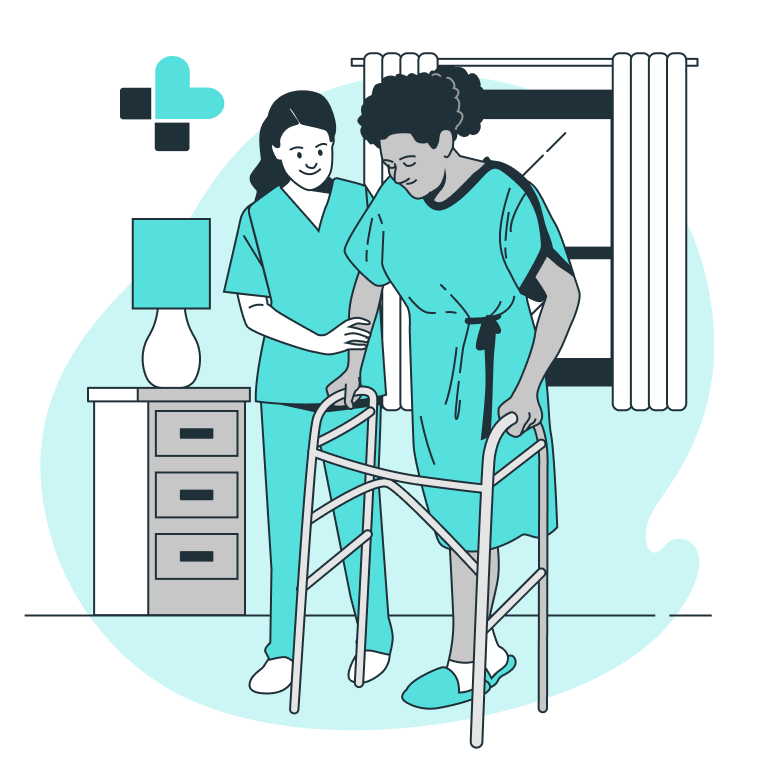You’re an RN who is ready for greater professional freedom and responsibilities. You know you want a hands-on job with plenty of clinical work. You’ve heard that a DNP or MSN is your ticket to success. But what kind of nurse practitioner do you want to be? And what kind of career can you aspire to? Learn more in our quick guide to the NP profession.
Nurse Practitioner Guide
Role of Nurse Practitioner
Nurse practitioners (NPs) are advanced practice registered nurses (APRNs) who are qualified to diagnose and treat acute illnesses and chronic medical conditions. In their role as expert advisers, NPs often counsel patients on disease prevention, health promotion, and lifestyle changes. They may support the patient’s family through difficult periods or address issues in the community that are affecting the population (e.g. substance abuse).
No matter what their specialty, nurse practitioners always work closely with teams of social workers, pharmacists, surgeons, physical therapists, and medical professionals to provide the very best of care.
Nurse Practitioner DNP Specialties
- Family Nurse Practitioner (FNP)
- Adult Gerontological Nurse Practitioner (AGNP)
- Neonatal Nurse Practitioner (NNP)
- Pediatric Nurse Practitioner (PNP)
- Psychiatric/Mental Health Nurse Practitioner (PMNHP)
- Women’s Health Nurse Practitioner (WHNP)
Nurse Practitioner Scope of Practice
Thanks to advanced training, an NP’s clinical competencies go well beyond those of an RN. In many cases, nurse practitioners are able to prescribe medications, perform advanced medical procedures, and practice independently. However, the ability to prescribe certain medications and practice without physician supervision varies from state to state, so please check with your State Board of Nursing if you are in any doubt.
Nurse Practitioner Career Paths
Nurse practitioners can be found in a huge range of settings, including hospitals, NICUs, clinics, private practices, nursing homes, schools, and correctional facilities. Graduate work for NPs includes training in leadership and healthcare policy, so many nurse practitioners also work as college professors, researchers, government policy experts, and patient advocates.
Nurse Practitioner vs. Clinical Nurse Specialist
One question you’re likely to face in your career is whether you wish to become a Nurse Practitioner (NP) or a Clinical Nurse Specialist (CNS). In a nutshell, NPs tend to work directly with patients, providing expert clinical care on a day-to-day basis. Clinical nurse specialists may have a wider scope of responsibilities, including education, project management, research, and consultation. For more details, check out the comparison chart in our profile of Clinical Nurse Specialists.
How to Become a Nurse Practitioner
1. Become a Registered Nurse (RN)
You can become a registered nurse by earning an associate’s or bachelor’s degree from an accredited school, amassing a certain number of clinical hours, passing the national NCLEX-RN exam, and earning a state RN license. A lot of schools now give you the chance to pursue your RN while you work on your bachelor’s degree.
2. Earn a Bachelor’s Degree in Nursing
You will find it very hard to apply to a DNP or master’s degree program if you don’t have a bachelor’s degree. Most nurses choose to earn a Bachelor of Science Nursing (BSN) in order to prepare for graduate studies. However, some universities will accept applicants who have a bachelor’s degree in a related healthcare field. If you already have your RN or LPN, you can apply for RN-BSN or LPN-BSN bridge programs.
3. Gain Experience
Although the clinical hours you complete in your DNP can be counted towards NP certification, most DNP programs will still expect you to have at least 1-2 years of RN clinical experience before you apply. Nurse practitioners have a hands-on job, and universities want to be sure you are qualified in direct patient care. We provide tips on experience requirements under each specialty profile.
4. Earn a DNP or Graduate Degree in Your Specialty
Once you have a current, active RN license, a recognized bachelor’s degree, and some experience under your belt, you’re ready to apply for a graduate degree in your NP specialty.
Currently, you only need a master’s degree in order to qualify as an nurse practitioner and complete your certification exams. However, there is a push in the nursing profession to make the DNP the minimum degree requirement for becoming a nurse practitioner. Obviously, we’re going to recommend you opt for the DNP, but discuss the decision with your mentors.
Within a DNP, you can expect to take general advanced practice registered nurse (APRN) courses before you focus on clinical training and subjects in your area of NP specialization. We talk more about typical curricula under each specialty profile.
Note: We discuss the relationship between DNP programs and nurse practitioners in our DNP vs. NP guide. Review this resource if you are trying to compare MSN and DNP nurse practitioner programs.
5. Obtain State Licensure
You must be licensed by your state in order to practice as nurse practitioner. Since each state has its own quirky licensing requirements, we recommend your check with your State Board of Nursing to figure out exactly what you need to do. In most cases, state boards will expect you to:
- Hold a current, active RN license.
- Earn an acceptable graduate degree (e.g. DNP, MSN, etc.) from an accredited program.
- Complete a set number of clinical hours.
- Pass a national certification exam from an organization such as the ANCC, the PNCB, or the AANP.
- Maintain licensure & certification through continuing education.
In some states, you may not need to take a national certification exam for licensure if you graduate from a state-approved NP program. However, you’re likely to improve your job opportunities if you are board certified in your specialty. We provide lists of specific certification requirements under each specialty profile.

